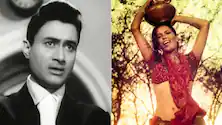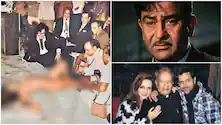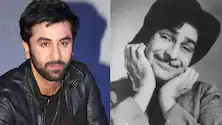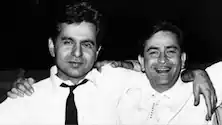By:
Moses
Navgire,
IndiaFM
Tuesday,
August
29,
2006
They
say
that
it
is
tough
to
make
people
cry
but
it
is
even
more
difficult
to
make
them
laugh.
However,
Hrishikesh
Mukherjee
was
one
filmmaker
who
could
make
your
eyes
moist
at
one
instant
and
suddenly
get
you
cracking
in
the
very
next
moment.
Sadly,
the
film
industry
lost
this
great
filmmaker
on
28th
August
2006.
Born
on
September
30,
1922,
in
Kolkata,
Hrishida,
as
he
was
popularly
known,
began
his
career
as
an
assistant
director
and
also
editor
to
Bimal
Roy
for
Do
Bigha
Zameen
(1953).
Mukherjee's
first
directorial
venture
though
was
Musafir
(1957),
which
was
an
episodic
film
with
three
parallel
stories.
Although
the
film
didn't
do
well,
Raj
Kapoor
was
so
impressed
with
Hrishida's
work
that
he
recommended
him
to
be
the
director
for
Anari
(1959)
starring
Raj
Kapoor
himself
and
Nutan.
The
film
was
an
emotional
drama
with
a
realistic
view
of
the
life
of
lower
middle
class
in
India.
Hrishida
retained
the
neo-realistic
style
of
filmmaking
from
his
mentor,
Bimal
Roy,
which
could
be
seen
in
this
film.
Lalita
Pawar's
character
of
Mrs.
D'sa
touched
the
audience's
hearts.
In
fact,
her
unique
style
of
speaking
Hindi
became
so
popular
that
it
stereotyped
the
accent
and
lingo
of
the
Christian
characters
in
movies.
The
film
was
a
major
success.
His
next
film
Anuradha
(1959)
that
was
a
story
of
a
doctor
who
neglects
his
wife
to
focus
on
his
work,
won
him
the
President's
medal
award.
Anupama
(1966)
again
was
a
sensitive
film
that
dealt
with
a
father-daughter
relationship.
Anand
(1970)
was
a
major
breakthrough
in
the
Indian
cinema.
It
is
a
story
about
a
man
(Rajesh
Khanna)
who
is
suffering
from
a
terminal
disease
and
in
his
last
few
days
makes
people
around
him
realize
how
precious
life
is
and
how
to
"live" life
to
the
fullest.
The
happy-go-lucky
character
of
Anand
with
a
dark
empty
space
inside
his
heart
played
by
Rajesh
Khanna
stands
out
to
be
one
of
his
finest
performances
till
date.
The
songs
in
the
film
are
classic
and
continue
to
be
so
meaningful,
even
in
today's
times.
Mukherjee
later
continued
with
films
like
Guddi
(1971),
Bawarchi
(1972),
Mili
(1975)
which
were
light
comedies
yet
with
a
realistic
message
that
would
shock
the
audiences,
sometimes
even
bringing
tears
to
their
eyes.
Abhimaan
(1973)
and
Namak
Haram
(1973)
were
two
of
his
landmark
films
that
came
out
in
the
same
year.
Where
Abhimaan
dealt
with
the
ego
problems
leading
to
major
issues
in
the
relationship
of
husband
and
wife,
Namak
Haram
gave
a
look
at
the
poor
status
and
miserable
living
conditions
of
the
mill
workers
in
that
era.
Hrishida,
however,
later
continued
with
his
comical
approach
towards
looking
at
life
with
films
like
Golmaal
(1979),
Khoobsurat
(1980)
and
Naram
Garam
(1981).
This
was
the
time
when
Amol
Palekar
became
his
favorite
hero
and
the
two
gave
birth
to
a
unique
type
of
comedy.
Another
of
his
film
Chupke
Chupke
(1975)
however,
can
safely
be
labeled
as
his
finest
work
in
the
comedy
genre.
The
film
starring
some
of
the
biggest
legends
in
Hindi
Cinema
like
Om
Prakash,
Dharmendra,
Amitabh
and
Jaya
Bachchan
and
Sharmila
Tagore
is
a
laughter
ride.
In
fact,
Dharmendra
and
Om
Prakash
have
given
one
of
the
best
performances
of
their
career
in
this
film.
He
co-directed
Sadma
(1983),
which
is
one
golden
film
that
the
Indian
Cinema
can
proudly
present
to
the
world.
The
film
is
a
brilliant
depiction
of
a
mentally
affected
girl
played
by
Sridevi
who
is
taken
care
of
by
a
stranger
(Kamal
Hasan)
who
falls
in
love
with
her
and
ends
become
retarded
himself
due
to
the
shock
of
loosing
her.
Hrishida
took
a
long
break
from
films
after
1988
and
made
a
comeback
a
decade
later
with
Jhoot
Bole
Kauwa
Kate
in
1998.
The
film
starring
Anil
Kapoor,
Juhi
Chawla,
Anupam
Kher,
Reema
Laagu
and
Amrish
Puri
was
again
a
comical,
somewhere
on
the
lines
of
Chupke
Chupke.
It
had
the
touch
and
essence
of
Mukherjee's
films
but
unfortunately,
failed
at
the
Box
Office.
However,
for
the
past
few
years,
Mukherjee
suffered
from
ill
health
and
finally
lost
the
battle
with
death
at
the
age
of
84.
Honored
with
Padma
Vibhushan
and
the
Dadasaheb
Phalke
Award,
Hrishikesh
Mukerjee
was
a
true
legend
of
the
Indian
Cinema.
The
kind
of
films
that
he
made
taught
people
how
one
should
extract
happiness
out
of
this
tough
life.
His
kind
of
films
were
what
we
call
today
as
sensible
cinema.
Moreover
his
films
were
evergreen,
not
losing
its
appeal
or
message
with
time!
So
even
today,
in
the
times
of
glamour
and
glitz,
Hrishida's
films
remain
close
to
the
hearts
of
people.
The
man
may
have
gone
away
from
this
world
but
his
films
will
continue
to
carry
the
flame
of
his
message
forever.




 Click it and Unblock the Notifications
Click it and Unblock the Notifications























